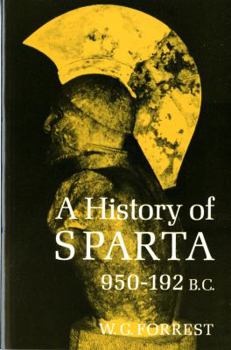History of Sparta, 950-192 B. C. (Revised)
Select Format
Select Condition 
Book Overview
This introductory history of Sparta gives readers a welcome overview of the intense and brilliant history of the great Greek city state.
Format:Paperback
Language:English
ISBN:0393004813
ISBN13:9780393004816
Release Date:March 1969
Publisher:W. W. Norton & Company
Length:162 Pages
Weight:0.39 lbs.
Dimensions:0.5" x 5.1" x 7.6"
Related Subjects
Ancient Anthropology Cultural Greece History Politics & Social Sciences Social SciencesCustomer Reviews
3 ratings
Good for What it Is
Published by Thriftbooks.com User , 18 years ago
History of Sparta 950-182 B.C. is a quick but painless introduction to Spartan history. If you've been reading Plato or Xenophon and are wondering why so many ancient scholars revered Sparta, this will give you some of the answers. It also shows the limitations of studying Sparta. One of the greatest lines of the book (I'm paraphrasing here) is, "Trying to understand the first century of Sparta from what is available is like trying to understand the 20th century from part of John F. Kennedy's speech about going to the moon, a few lines of "Smoke Gets in Your Eyes" and a few lines of "Honeysuckle Rose." A few people might find it less than readable if they expect a dastardly vivid account of Spartan training and life. This book simply goes with the facts and doesn't speculate as much as Bertrand Russell does in History of Western Philosophy. If you're looking for stories of evil Spartans inciting helot revolts just to practice murdering people or of young soldiers-in-training being tortured, watch the History Channel. This book is a little more dignified.
A quick tour of Spartan history
Published by Thriftbooks.com User , 22 years ago
This is a wonderful book for the person who has a passing interest in ancient Sparta, but is unwilling to spend a whole lot of time doing research on the subject. At just over 150 pages, W.G. Forrest offers a readable and informative text that gets you into Lacedamon, out of Lacedamon & on your way in almost no time at all.What is surprising about this study is that the author does not hold the Spartans in particularly high regard. This is unusual in that normally, as a rule-of-thumb, historians either write extensively on people / social organizations that they are fervently in favor of, or utterly despise. It is evident that Forrest neither loves nor hates the Laconians; he merely writes about them.Forrest covers the period of expansion, which is when Sparta exerted its hegemony (forcefully) over Messenia. It is little wonder that the Messenians despised the Spartans, but slaves throughout history have generally not been treated well. I am inclined to cringe at the tacit notion that the Spartans were the only culture in all of history that treated its slave workforce egregiously.Forrest offers a nice summary of the influence of Lycurgus, but does not articulate very many of his revolutionary ideas. Forrest goes on to explain how the political machinery of Sparta worked, utilizing the Gerousia, ephors and 2 monarchs. For a people who craved simplicity, the political system of Sparta was quite cumbersome. Then again, it was likely that way by design, so that nothing would ever get done. At any rate, Forrest also discusses some different interpretations of the epoch of Lycurgus' life and the the dates of his reforms. Much of this, however, will be of only remote interest to the average reader.The most gripping part of this book, sadly, is about the fall of the civilization. After their decisive defeat at the hands of the Thebans in 371 @ the battle of Leuctria, Sparta sent out a much smaller army to combat their enemy. However, realizing that the situation was hopeless and they were too outnumbered, the army turned around and returned to the homeland.I have often been fixated on this about-face of a supposedly invincible Spartan army. It was at this juncture in time that group of warriors decided to turn their backs, not only on an empire, but on a way of life. Gone was the doctrine of Leonidas to "stand and fight to the last man, no matter what the circumstances, no matter the number of the enemy." Sparta would never be the same after 371, and it is with haunting detail and clarity that Forrest takes us thru that sad chapter in Greek history.This book is highly recommended for those who wish to read of the rise and decline of group of brutal warriors who fielded the most fierce armies of the classical age. These were the men who created the boot camp which military forces still use (to varying extents) in the present day.
Concise History of Sparta
Published by Thriftbooks.com User , 23 years ago
W.G. Forrest's short book is probably one of the best books on Spartan history available. Though the book is short it covers almost the entire history of Sparta including the Dorian history leading up to it and the decline as it became part of the Roman empire. The material is not covered in excessive depth, but there are extensive references to more detailed studies. The author often editorializes about Spartan society. In general he is very critical of the Spartan's lack of societal development. He overlooks some of the good qualities of Spartan society that are discussed in other books. This book is a great choice for anyone newly interested in Sparta. It is also a good review or guide to more experienced classics students.






